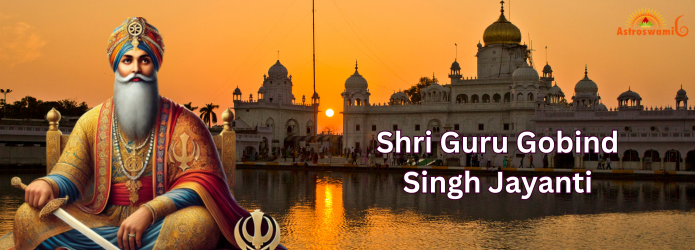
Guru Gobind Singh Jayanti is a sacred day observed by millions of Sikhs and admirers worldwide. It marks the birth anniversary of Guru Gobind Singh Ji, the tenth and final human Guru of Sikhism. Born on December 22, 1666, in Patna Sahib (modern-day Bihar, India), Guru Gobind Singh's life was a testament to bravery, wisdom, and spiritual leadership. His legacy continues to inspire and guide people to uphold righteousness and fight against oppression.
This article delves into the life, teachings, and significance of Guru Gobind Singh Jayanti, celebrating a leader whose contributions have shaped Sikhism and human values.
Guru Gobind Singh, born as Gobind Rai, was the son of Guru Tegh Bahadur Ji, the ninth Guru, and Mata Gujri Ji. His childhood was marked by both joy and adversity. From a young age, he displayed remarkable intelligence, courage, and devotion to his faith. His family’s sacrifices for religious freedom deeply influenced his resolve to fight for justice.
At the tender age of nine, he witnessed the martyrdom of his father, Guru Tegh Bahadur Ji, who sacrificed his life to protect the rights of Hindus and other minorities under Mughal persecution. This event shaped Guru Gobind Singh's mission to stand against tyranny and uphold the principles of equality and freedom.
One of Guru Gobind Singh’s most transformative contributions to Sikhism was the establishment of the Khalsa Panth in 1699. On the festival of Vaisakhi, Guru Gobind Singh initiated the "Five Beloved Ones" (Panj Pyare) and founded the Khalsa, a community of saint-soldiers committed to protecting the oppressed and living a life of high moral standards.
The Khalsa represented a radical departure from conventional norms. Members were required to uphold the five "Ks":
This reformation unified Sikhs and gave them a distinct identity, embodying both spiritual and martial virtues.
Guru Gobind Singh was not only a spiritual leader but also a fearless warrior who led his followers in defending their faith against oppressive regimes. His life was a constant battle against injustice. He fought numerous wars, not for personal gain, but to protect religious freedom and human dignity.
He authored several spiritual and philosophical texts, including Jaap Sahib, Tav-Prasad Savaiye, and Zafarnama, which continue to inspire people with their wisdom. His poetic compositions emphasize the virtues of bravery, humility, and devotion to God.
Guru Gobind Singh's life was filled with sacrifices for the greater good. He lost his entire family in the fight for justice. His four sons, known as the Chaar Sahibzaade, became martyrs. Two of his elder sons were killed in the Battle of Chamkaur against Mughal forces, while the younger two were bricked alive under the orders of Wazir Khan, the Mughal governor of Sirhind. Despite these tragedies, Guru Gobind Singh remained steadfast in his mission, emphasizing that faith and resilience can overcome any challenge.
Guru Gobind Singh’s teachings transcend time and are deeply relevant in today’s world. He emphasized the following principles:
Guru Gobind Singh believed in the equality of all humans, irrespective of caste, creed, gender, or religion. His creation of the Khalsa was a declaration of unity and a rejection of societal hierarchies.
“Chardi Kala,” or eternal optimism, was a guiding principle of Guru Gobind Singh. He encouraged his followers to remain courageous and hopeful even in the face of adversity.
Service to humanity was central to his teachings. He urged his followers to dedicate themselves to the welfare of others, embodying the Sikh principle of “Seva.”
Guru Gobind Singh reinforced the belief in Ik Onkar (One God). He advocated for a life of devotion and adherence to divine will.
Guru Gobind Singh Jayanti is celebrated with great fervor and devotion by Sikh communities worldwide. The festivities typically include the following:
Devotees gather at Gurdwaras, where they participate in special prayers and sing hymns praising Guru Gobind Singh’s life and teachings.
An uninterrupted recitation of the Guru Granth Sahib, the holy scripture of Sikhism, is performed to honor the Guru’s legacy.
A communal meal, or Langar, is served to all attendees, symbolizing equality and the spirit of selfless service.
Vibrant processions, known as Nagar Kirtans, showcase the teachings and life of Guru Gobind Singh. Sikhs march together, chanting hymns and spreading messages of peace and unity.
In a world fraught with division and intolerance, the teachings of Guru Gobind Singh serve as a beacon of hope. His ideals of equality, justice, and selflessness remind us of the importance of compassion and standing up for what is right.
Celebrating Guru Gobind Singh Jayanti is not just a tribute to a historical figure; it is a call to imbibe his values and apply them in our daily lives. His emphasis on resilience, optimism, and spiritual devotion offers guidance for navigating life’s challenges.

Many festivals are celebrated in India and Shardiya Navratri festival has a great historical background....

The mind is represented by moon, its placement, condition and afflictions in the birth chart. ...

Sawan Shivratri 2022 - Holy month of Sawan is going on. This month, Shivaratri is considered special....

Tirupati Balaji Temple is one of the richest temples located in Andhra Pradesh....